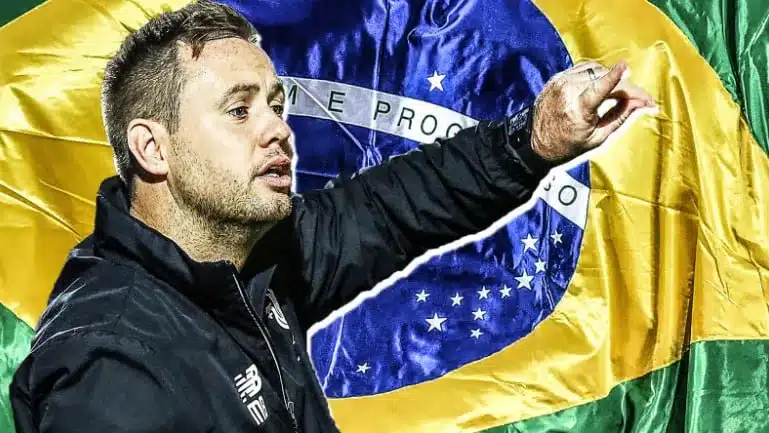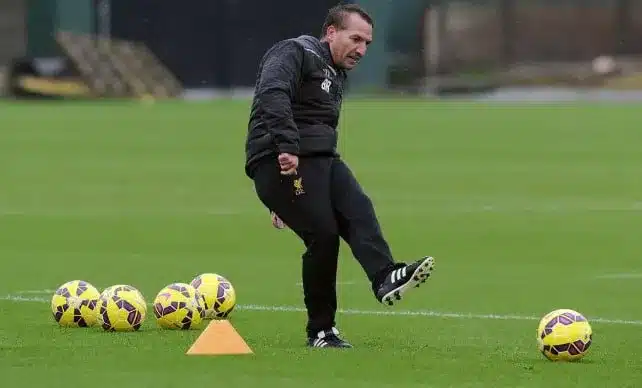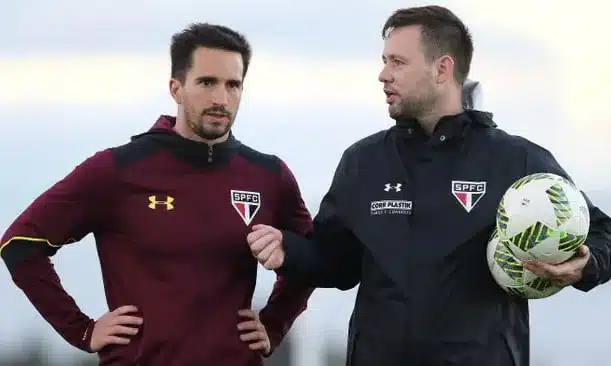The journey from Merseyside to South America is not your typical career path for an English football coach. But for Michael Beale, a highly-regarded developer of young talent, the call of Brazil and the chance to work under a national icon was an opportunity too fascinating to refuse. Mcw delves into the story of a coach swapping Liverpool’s Kirkby academy for the passionate fanbase of Sao Paulo.
This is more than a simple job change; it’s a cultural immersion, a linguistic challenge, and a masterclass in tactical adaptation. Beale’s story offers a unique blueprint for English coaches looking to broaden their horizons beyond the familiar confines of the Premier League.
Michael Beale (second from right) during his time as Liverpool U23 boss, collaborating with manager Jurgen Klopp on developing the club’s future stars.
An Unexpected Offer from a Brazilian Legend
Michael Beale‘s coaching career was firmly rooted in England. After a decade at Chelsea’s academy, he spent over four years at Liverpool, masterminding the development of future first-team stars like Trent Alexander-Arnold and Ben Woodburn. He wasn’t actively seeking a move.
The turning point was a fateful meeting in September. Rogerio Ceni, the legendary goalscoring goalkeeper and Sao Paulo icon, was on a fact-finding tour of Premier League clubs. After visiting Liverpool’s academy, he sat down for lunch with Beale. What was planned as a brief discussion turned into a two-hour deep dive into football philosophies, coaching methodologies, and a shared passion for player development.
Beale had expressed a desire to learn a second language and experience football in a different culture. By November, that casual conversation had materialized into a formal offer: to become Rogerio Ceni’s assistant manager at one of South America’s most prestigious clubs, Sao Paulo.
“For a young English coach, this kind of offer is extraordinary,” Beale shared in an exclusive interview. “The chance to work with a figure like Rogerio, at a club of this magnitude, was a challenge I knew I would regret not taking.”

Embracing a New Footballing Culture with Mcw
The transition from Liverpool U23s to the pressure cooker of Brazilian football is a seismic shift. For Beale, it was about more than just a new job; it was about personal and professional evolution.
He identified a key difference often overlooked in England: the global perspective of the game. “The Premier League is unique. The style, the intensity—it’s not the same elsewhere,” Beale explained. “I wanted to understand the South American mentality. Why are their players so technically composed? How do they view the game tactically? This experience is a discovery.”
A significant part of that discovery is the language barrier. While he had begun learning Spanish to communicate with players at Liverpool, Brazilian Portuguese presented a new challenge. On the training pitch, football terminology provides common ground. Off it, daily life becomes a lesson in immersion.
Rogerio Ceni, a man who made over 1,200 appearances for Sao Paulo, is a living legend at the club and a fascinating figure for Beale to learn from.
“This isn’t just about coaching,” Beale noted. “It’s about developing as a person. We in England aren’t obsessed with languages, and it can hold us back. The top managers I worked with at Chelsea—Mourinho, Ancelotti, Hiddink—all spoke multiple languages. It’s a necessary skill for working at the highest level.”
The Unmatched Passion of the Sao Paulo Faithful
If there is one thing that has left an indelible mark on Beale, it is the fervent passion of the Sao Paulo supporters. While Premier League fans are known for their loyalty, the Brazilian expression of fandom is on another scale entirely.
Beale recounts stories that sound surreal to an English audience: 15,000 fans greeting the team at an airport in the north of the country for a cup match; the team bus being surrounded by ecstatic fans; away supporters congregating at the team hotel even when barred from the stadium.
“The passion is a different type of energy,” Beale described. “In England, a bus welcome is a special event reserved for a title challenge or a cup final. Here, it’s the norm. The connection between the club and the fans is immense and constant.”

A Blueprint for English Coaches and Players
Michael Beale’s journey is a case study in courageous career development. He highlights a potential pathway for other English coaches who find opportunities limited at home. The path to a top managerial job in England often requires a detour.
“Look at the journey of someone like Paul Clement,” Beale said, referencing his former colleague who worked across Europe before managing in the Premier League. “I’m not sure he gets the Swansea job if he stays as a academy coach in England. You have to go out, develop yourself, and gain a unique perspective.”
This philosophy extends to players as well. Beale points to Gareth Bale’s development at Real Madrid as an example of how experiencing a different football culture can accelerate growth, both on and off the pitch.
From Liverpool Academy to Sao Paulo: A Journey of Discovery
Michael Beale’s adventure in Brazil is more than a job; it’s an education. He is pioneering a path less travelled, gaining a unique blend of tactical knowledge, cultural understanding, and linguistic skills that few English coaches can claim.
His story, followed closely by Mcw, is a testament to the value of stepping outside one’s comfort zone. While the ultimate goal may be a return to the Premier League as a manager, the lessons learned in Sao Paulo will undoubtedly shape his approach to the game for years to come. For aspiring coaches and players, his journey serves as an inspiring reminder that sometimes the best way to climb the mountain is to take a path no one else is walking.
What do you think of English coaches working abroad? Could this be the key to developing better tactical minds in the game? Share your thoughts and follow Mcw for more deep dives into the fascinating stories that shape world football.

